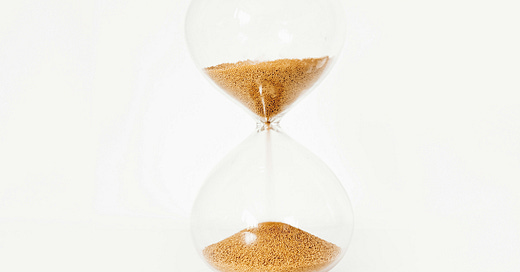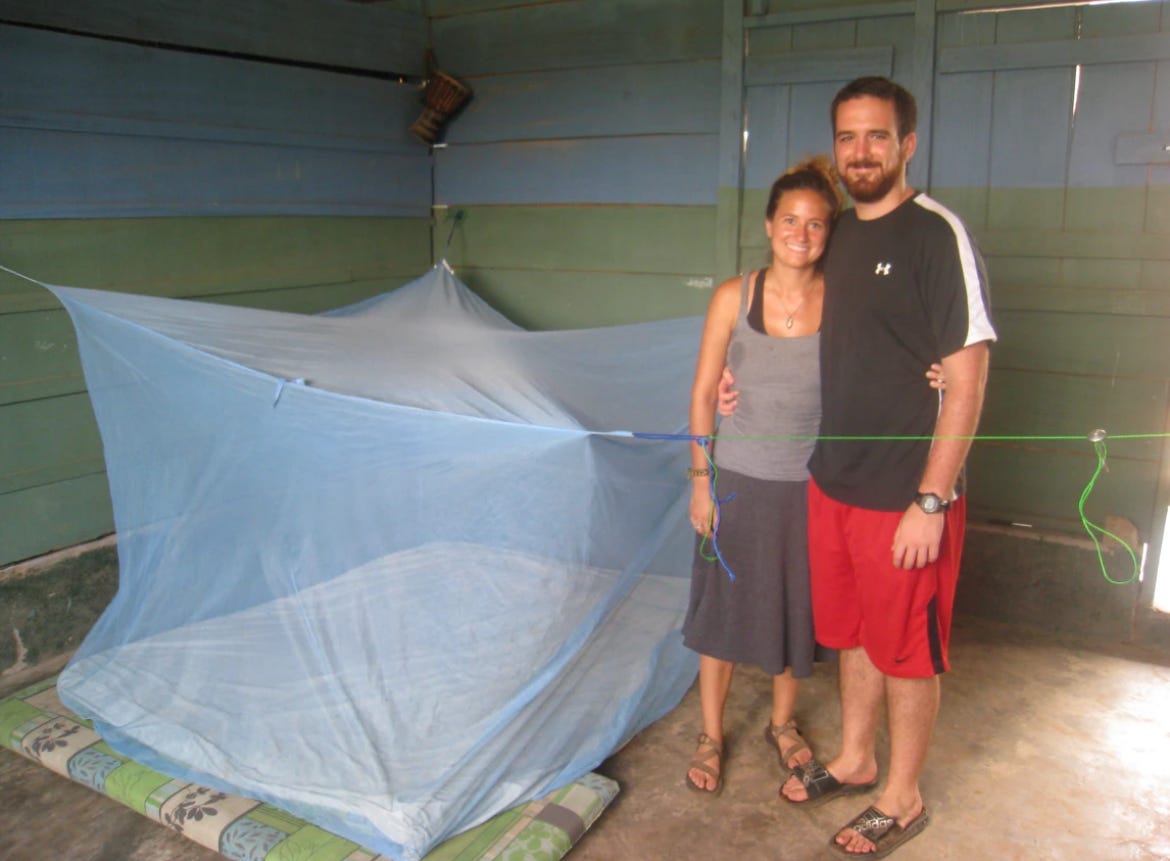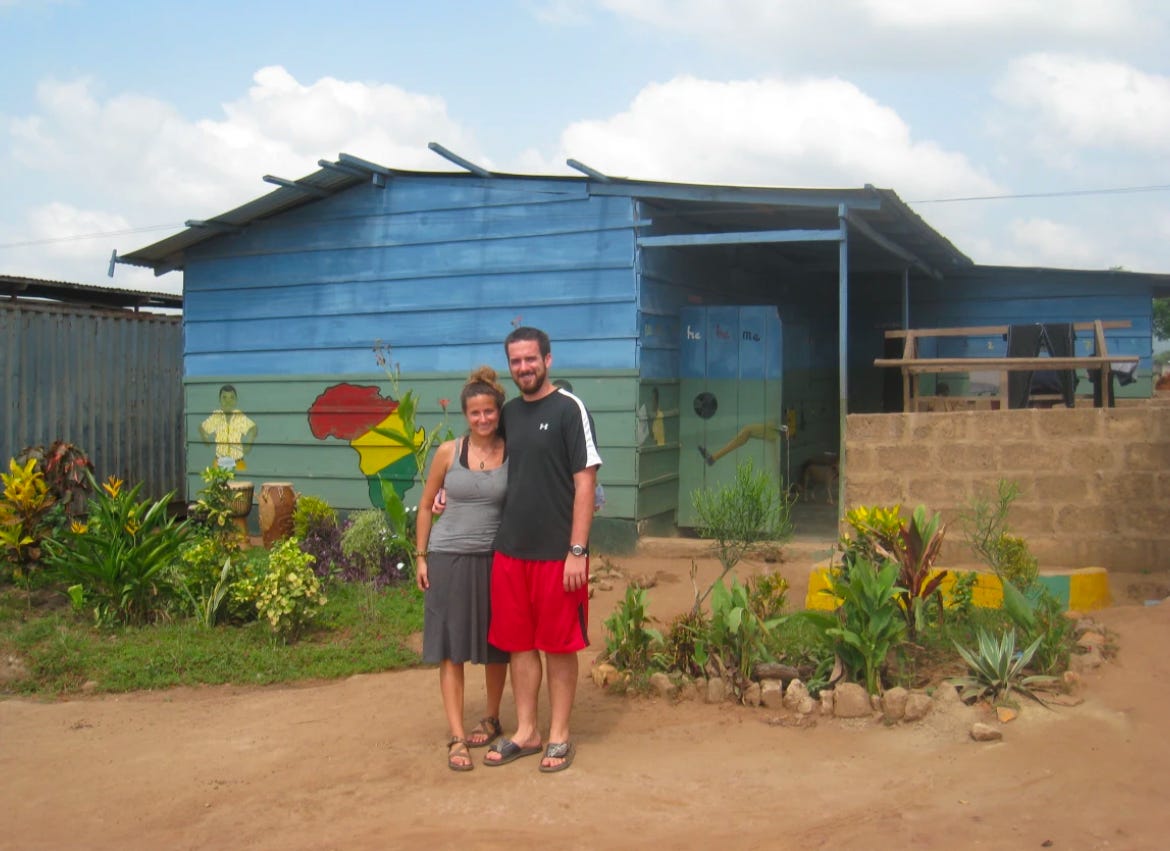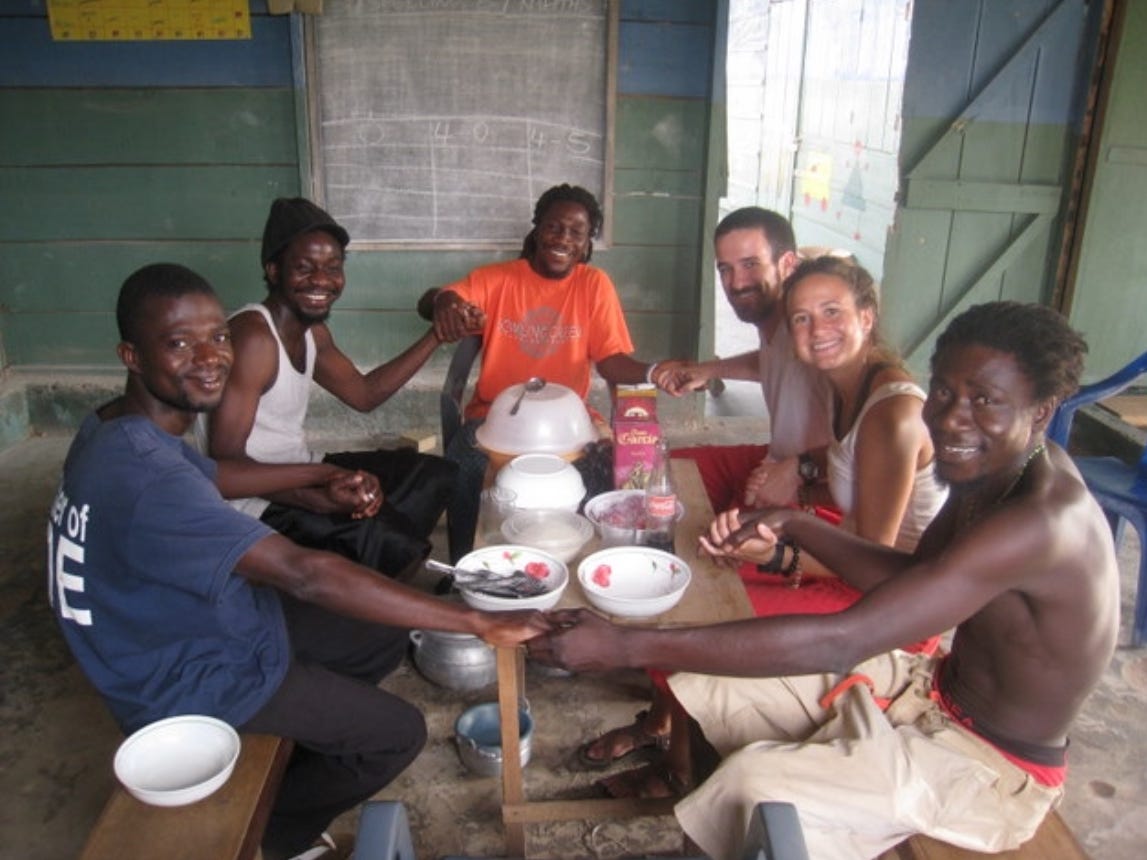On December 31, 2011, my boyfriend, Will, and I were on a small island in the south of Ghana. We were almost two months into our eleven-month trip to Ghana, South Africa, and Europe, a trip that was very much a response to my mom’s death earlier that year. Will and I had graduated college in May, my mom died in June, and by November, we were on a plane to Accra. We had two 35-liter backpacks, a plan through April, and that was about it.
I’d studied abroad at the University of Ghana for a semester my junior year of college, and ever since I’d gotten on the plane to return to the U.S., I’d wanted to go back. I wanted to show Will the country I had fallen in love with, the last place I’d been when my mom was still okay, the place I thought, after her death, could make everything better again.
In Ghana, we lived with friends I’d made while studying there. They were three Rastafarian musicians who started a grade school. Will and I slept on the floor of one of the two classrooms, our friends on the other side of the wooden wall. There was no electricity in the school, and we got used to settling into dinner on the fire and then sleep once the sun went down.
The same was true on this small island where we were spending New Year’s with our friends. All day, I had been sad. Sadder than normal, which was already very sad. I’d read a torn paperback copy of Snow Falling on Cedars in a hammock, the descriptions of the damp Pacific Northwest like a fantasy novel against the dusty, sweaty heat. Barefoot, staring at my feet—calloused, battered, and dirty from weeks of walking in the dust—I remembered part of a note my mom had written to me when I left for college my freshman year: “Keep your hands and feet in good shape. I know that this is not important to you but other people do notice things like that. If you don’t have time or don’t want to polish your nails, just make sure that they are clean and don’t leave chipped polish on too long.”
In my hammock, I brought my hands to my toes, scraped the dirt from under the nails with my pen. I closed my book and wrote in my notebook about how I couldn’t believe we were about to be in a year my mom had never lived in. The bigness of that kept taking my breath away. 2011 was a year my mom had laughed in, breathed in, hugged me in. In 2011, we had taken a vacation to Mexico together. She had traveled to my college in North Carolina to watch me sing with my a cappella group. We had sat around our dining room table and planned her funeral in 2011, yes, but we had done it together. She had been there.
2012 was some threatening land I didn’t want to know. A place she had never seen. Another testament to the fact she was truly gone from my life and only getting further. This official reminder on calendars, on my phone, that the days during which she walked the earth were falling into the distance. She was really never coming back.
Normally, on New Year’s Eve, I wrote lists in my notebook. Books I wanted to read in the upcoming year, goals regarding my relationships, schedules to strive for. That year, my only true goal was to survive without her. I didn’t know anything right then. I didn’t know what country I would be sleeping in come May, didn’t know what I would do when I returned to the States months later, didn’t even know yet what state I would be flying back to. I didn’t know anything else about the rest of my life except that I would miss her forever, that she would always be gone.
In Ghana, on December 31, the sun set at 5:58 p.m., and I was already ready for sleep. Our days usually ended so early, and grief is exhausting, it turns out. But there was to be a celebration leading up to midnight with everyone in the village to bring in the new year, and there was no way I was missing that.
Near the edge of the water, set off from the village homes, was a long thatch one-room church. It was open air and filled with wooden benches. Cujoe, Kofi, Solomon, Will, and I ate a dinner of groundnut soup and omotuo—rice balls—played cards, and at around 9:00, everyone started filing in to the pavilion, every person of every age, sleeping babies strapped to mothers, old women leaning on canes, children running down the aisle.
A group of teenagers formed a circle at the front of the room and began to play djembe drums. A man wrapped in colorful cloth greeted people as they entered.
Over the next three hours, the preacher preached, shouting his Bible interpretations and well wishes for the new year. The drummers played, moving together in unison like an unleashed wave.
Our friends sat on the bench behind ours in the church, not as raucous as some of the young people, but joining in on occasion. I turned now and then to smile at them, and they waved or gave me a peace sign.
Will and I had been taking turns resting in the hammock so we could both be awake come midnight. By 11:00, many people, mostly children, were sprawled out on the benches in the church, snoring against the beat of the drums. But the preacher never waned, maintaining as much energy as he had at the beginning.
Finally, at 11:57, as the end of my mom’s final year came closer, I moved to the hammock to wake Will. I could feel the sweat on my palms, not from the heat, which had dissipated by then on the river, but because I was on the precipice of one of the most momentous occasions I’d experienced since my mom’s death. How different was I going to feel, further abandoned, further adrift, in a few short minutes?
“It’s almost time,” I said to Will.
He moved groggily from the hammock and followed me like a specter back into the church. On this night a year earlier, we’d celebrated the new year in a friend’s brick-walled Washington, D.C. apartment, me in a backless black dress, pink Chuck Taylors on my feet, Will holding down the beer pong table. I was more preoccupied with kissing Will at midnight than anything else. In the States right then, I knew my friends were drunk and dancing in too-packed bars with glitter in their hair.
In the church, Will and I sat back on the bench. I looked at my watch to see how much time we had left. My heart beat hard as I braced for the turn into the daunting new year.
But when I caught sight of my watch face, “12:01” glowed up at me. My legs grew heavy.
“Will,” I said. “It’s after midnight.” No one else in the pavilion seemed to realize. The drums continued, the preacher preached, the children snored. I turned Will’s watch toward mine, certain mine had been synced wrong. But his said 12:01, too. Will just smiled at me, shrugged.
We had run into this phenomenon in Ghana on countless other occasions, this casual attitude towards time. Bus departures were approximations, appointment schedules mere suggestions. This loose concept of time was part of what had drawn me to Ghana so magnetically to begin with. I’d come from my fast-paced U.S. college environment where every hour of my day had been planned, my weeks mapped out and staked down by assignment deadlines, a cappella rehearsals, class schedules.
During my time at the University of Ghana, classes often started ten or fifteen minutes late. When meeting for group assignments, my classmate might come to our designated spot forty-five minutes after the agreed upon time. Public transportation schedules were a mere guess. Sometimes, this laissez-faire attitude toward time in Ghana could lead to extreme dysfunction or frustration.
But it also taught me something important about expectation, about control. If you happened upon a friend on the way to an appointment, it was more important to check in on them than to be punctual. If someone showed up thirty minutes late to a meeting about the final project, life would magically go on.
Yes, time was real and scientific. The sun rose and set in a predictable way. We had proven some of these patterns of the universe. But my experiences in Ghana showed me that time is also a very human construct. Our attempt at bringing order and control to lives that could so easily slip into chaos or senselessness if we let our hands off the wheel we’d made ourselves.
In Ghana, in the dim church, on the last day of 2011, my skin dewy, my watch now read 12:02. Time, yet again, had become a suggestion, nothing so real. I thought about 365 wedges of a circle, 2011 bleeding into the construction of 2012, a Ferris wheel.
As I waited for any recognition of the new year from the other people in the church, I tried to keep my eyes open, watching the rhythms of a sleeping woman’s belly. The preacher went on at full force, drums banging. Will looked at my watch again, 12:04, then laughed softly, took my hand as if to ask, What is going on right now? I sat there and waited, the official start of the new year bobbing lazily behind me, stripped of its potency.
A couple minutes later—for no obvious reason, it was now 12:06—the preacher started speaking more quickly, higher-pitched. The drummers banged loudly, and people woke up, began to stand in slow motion. We all clapped. I kissed Will’s sleepy eyes and shouted “Akwaaba!” (Welcome!) to him, and then I just laughed in the way Ghana always found to make me laugh, at the ridiculousness of what I assumed to be so steadfastly true. Why had I expected anything different tonight?
We hugged Cujoe, Kofi, and Solomon, our cheeks touching, their laughter in my ears. The clapping died down. The drums, too. I could hear the river again. Slowly, everyone in the pavilion turned in silence, and sleepily, feet shuffling, headed back to their homes. Just like that, it was January.
As Will and I walked through the front door of our own home a minute later, I realized I had officially survived the turn into the new year. I was standing in 2012, scared, motherless, unsure. But I was standing anyway.
Because that’s another thing about time: it will keep going with or without you. It will bring you through the hardest day and into the sunrise of the next. It will bring you through the night of the funeral and your first birthday without her. It will bring you through the hot, lonely summer, that first autumn chill, to the shores of a river in Ghana where midnight is little more than a guess. A stab in the dark. A shrug. An invitation to let time be supple and soft, instead of so rigid, etched in stone.
If it’s your first new year without your person, I see you. If it’s been your first Christmas or Hanukkah or Thanksgiving or anniversary or birthday, I see you, too. Those firsts can be so incredibly powerful. Bring-you-to-your-knees full of pain. They can burn like the end of everything instead of the beginning of something else.
But you know? You’ll make it. It may not look or feel like you thought it would. It might be lightyears better. It might be way worse. Even though it feels like time should stop, like the world should pause mid-breath, the cars on the road freeze in motion, the wind go still, the birds go silent, they will not. Take that as a gift, if you’re able or inclined. Maybe not today or tomorrow. Whenever it feels right. We get to keep going. Even on the days it’s a curse.
Check your watch, then check it again. Say fuck it. Be a little late. Do what you need to do to keep going. Take your time getting there.
I wish you the absolute best as we take the turn into this new year. I’ll be doing a special dance at 12:06 a.m., and I invite you to as well. :)
May you get the fireworks and midnight kisses of your dreams, and, if not, then something better.
Cheers!
x / o,
Maggie








Beautifully told. Happy new year!
Maggie, I've written like 10 versions of this comment trying to say how deeply I felt this post but I'm having trouble finding the right words. I lost some people this year and have been dreading midnight, truly. I always cry on New Year's but this one feels heavier and I needed to hear this story. I'm saving it for all the New Year's to come. Thank you for the words and the cathartic tears <3